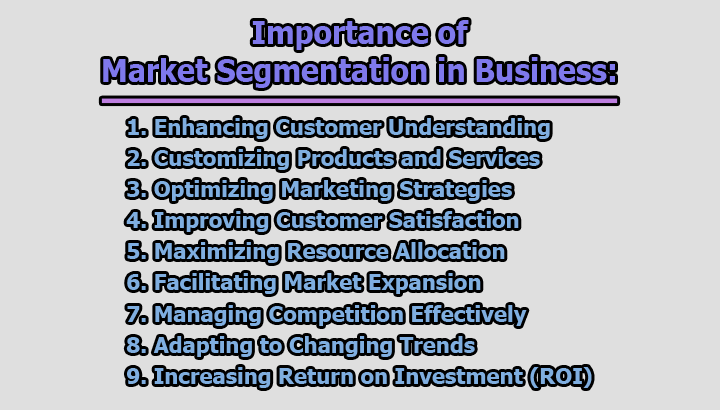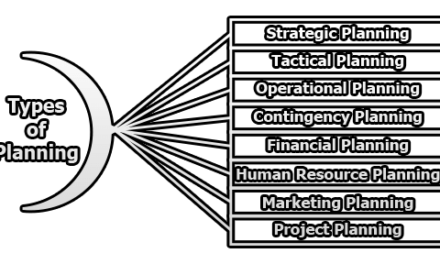Importance of Market Segmentation in Business:
Market segmentation is a strategic tool that allows businesses to categorize their target audience into distinct groups based on specific characteristics. This enables companies to tailor their products, services, and marketing strategies to meet the unique needs of each segment. Here are some of the importance of market segmentation in business.
1. Enhancing Customer Understanding: Market segmentation serves as a powerful mechanism for businesses to deepen their understanding of the diverse customer base. By categorizing consumers into specific segments, companies can analyze the unique needs, preferences, and behaviors of each group. This detailed insight into customer profiles forms the foundation for strategic decision-making, enabling businesses to develop targeted approaches for product development and marketing.
Understanding the intricacies of customer behavior within each segment allows businesses to identify patterns and trends. For example, one segment may prioritize price sensitivity, while another values premium quality and is willing to pay a premium. Armed with this information, companies can fine-tune their product offerings, pricing strategies, and communication channels to align with the expectations of each segment.
2. Customizing Products and Services: Recognizing that a one-size-fits-all approach is often inadequate, market segmentation empowers businesses to customize their products and services. Tailoring offerings to specific segments ensures that they address the unique requirements and preferences of each group. This customization can extend to product features, packaging, pricing models, and even after-sales support.
For instance, a technology company may offer different versions of a software product to cater to both professional users and casual consumers within different segments. This customization not only enhances customer satisfaction but also fosters brand loyalty as consumers perceive the brand as one that understands and meets their distinct needs.
3. Optimizing Marketing Strategies: Market segmentation plays a pivotal role in optimizing marketing strategies. Armed with detailed insights into each segment, businesses can develop targeted and personalized marketing campaigns. This precision in marketing communication ensures that messages resonate more effectively with the intended audience.
Marketing resources, both financial and human, are finite. Without segmentation, businesses risk spreading their resources thinly across a broad market, diluting the impact of their efforts. However, by focusing on specific segments, companies can allocate resources more efficiently, achieving a higher return on investment (ROI) for their marketing expenditures.
4. Improving Customer Satisfaction: Customer satisfaction is a cornerstone of business success, and market segmentation contributes significantly to this aspect. When businesses understand the distinct needs of different customer segments, they can align their products and services to meet those needs effectively. This alignment results in higher levels of customer satisfaction as consumers perceive the business as responsive to their preferences.
For instance, an e-commerce platform might recognize that one segment values fast shipping and efficient customer service, while another prioritizes a wide variety of product choices. By tailoring their services to these specific expectations, the platform enhances satisfaction among both segments, building a positive reputation and fostering repeat business.
5. Maximizing Resource Allocation: Efficient resource allocation is crucial for businesses looking to operate effectively and sustainably. Market segmentation allows companies to allocate their resources more strategically by focusing on segments with the highest potential for profitability. This targeted approach prevents wastage of resources on marketing efforts that may not yield significant returns.
Consider a beverage company that identifies through segmentation that a specific demographic prefers healthier, low-sugar options. Instead of allocating resources to promote the entire product line indiscriminately, the company can concentrate its marketing efforts and resources on promoting the healthier alternatives to this particular segment, thereby maximizing the impact of its promotional activities. This targeted allocation of resources ensures a more efficient use of budget and personnel, ultimately contributing to the company’s bottom line.
6. Facilitating Market Expansion: Market segmentation serves as a valuable roadmap for businesses aiming to expand their market presence. By identifying untapped or underserved segments, companies can develop targeted strategies to enter new markets successfully. This proactive approach to expansion is essential for sustained growth, especially in industries where competition is fierce, and saturation in existing markets is a concern.
For example, a fashion retailer may discover through market segmentation that there is a growing demand for sustainable and eco-friendly clothing in a particular geographic region. Armed with this insight, the retailer can tailor its expansion strategy to prioritize this market, offering products that align with the preferences of the environmentally conscious segment.
7. Managing Competition Effectively: In highly competitive markets, understanding the specific needs and preferences of different customer segments provides a strategic advantage. Businesses can position themselves uniquely by catering to niche segments that may be overlooked by competitors. This differentiation helps in building a strong market presence and mitigating the impact of intense competition.
Consider a smartphone manufacturer that identifies a segment of consumers who prioritize durability and robustness in their devices. By focusing on this niche, the company can develop and market rugged smartphones, differentiating itself from competitors who may primarily emphasize features like camera quality or design. This targeted approach not only attracts a specific customer base but also reduces direct competition in the chosen niche.
8. Adapting to Changing Trends: Consumer preferences and market trends are constantly evolving, necessitating businesses to stay agile and adaptive. Market segmentation equips companies with the flexibility to adjust their strategies swiftly in response to these changes. By regularly reassessing the characteristics and needs of each segment, businesses can ensure that their offerings remain relevant and responsive to the dynamic nature of the market.
For instance, an electronics manufacturer may observe a shift in consumer preferences towards smaller, more portable devices within a specific age group. By recognizing this trend through market segmentation, the company can adjust its product development and marketing strategies to capitalize on the demand for compact electronic devices among this segment.
9. Increasing Return on Investment (ROI): A targeted approach to marketing and resource allocation, facilitated by market segmentation, directly contributes to a higher return on investment. By focusing efforts on segments with the highest potential, businesses can optimize their spending and generate more significant returns from their marketing initiatives.
Suppose an online streaming service identifies through segmentation that a particular demographic is more likely to subscribe to premium plans. By tailoring promotional offers and marketing campaigns specifically for this segment, the streaming service can enhance its conversion rates and increase revenue per user. This targeted strategy ensures that marketing resources generate a higher ROI compared to generic, broad-based approaches.
In conclusion, market segmentation stands as a fundamental and indispensable practice for businesses aiming to thrive in a competitive and dynamic market environment. By enhancing customer understanding, customizing products and services, optimizing marketing strategies, improving customer satisfaction, and maximizing resource allocation, businesses can navigate the complexities of the market more effectively. Furthermore, by facilitating market expansion, managing competition, adapting to changing trends, and increasing ROI, market segmentation emerges as a strategic imperative for long-term success. Embracing this approach ensures that companies remain agile, customer-centric, and well-positioned for sustained growth and profitability.

Library Lecturer at Nurul Amin Degree College










